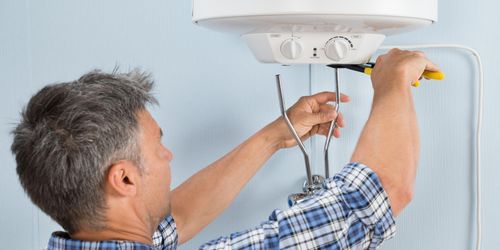Tackling the Typical Water Heater Crisis Scenarios
Tackling the Typical Water Heater Crisis Scenarios
Blog Article
This article following next involving Warning Signs You Need Water Heater Repairs is particularly engaging. You should check this stuff out.

A hot water heater is among the most essential fundamental appliances that can be discovered in a residence. With hot water heater, you don't need to experience the tension of heating water by hand every time there is a need to take a bath, wash, or the meals. There is always a possibility that your water heating system would certainly act up as with most mechanical devices.
It is essential to keep in mind any kind of little breakdown as well as tackle it swiftly before things leave hand. Most times, your hot water heater begins to malfunction when there is a build-up of sediments as a result of continuous usage. As a preventative measure, periodic flushing of your water heater is suggested to avoid sediment build-up as well as avoid useful failure.
Common hot water heater emergency situations as well as how to handle them
Inadequate hot water
It may be that the water heating unit can not sustain the warm water need for your home. You could update your water heating unit to one with a larger capability.
Varying water temperature level.
Your water heater could start producing water of various temperatures normally ice hot or cool hot. There may be a demand to replace either the thermostat or the home heating device of your water heating unit.
Leaky water heater storage tank.
In this circumstance, you must turn off your water heater, permit it to cool down, and also thoroughly look for the resource of the problem. At times, all you require to do is to tighten up a couple of screws or pipeline links in situations of small leakages. If this does not function and the leak persists, you might need to employ the services of a specialist for an appropriate substitute.
Blemished or odiferous water
When this takes place, you require to understand if the concern is from the tank or the water source. If there is no funny scent when you run chilly water, then you are certain that it is your water heating unit that is faulty. The stinky water can be triggered by rust or the accumulation of bacteria or debris in the water heating unit container.
Verdict
Some house owners ignore little caution and minor faults in their water heater unit. This only results in further damage and a possible total failure of your appliance. You must handle your water heater faults as soon as they come up to avoid even more expenditures and also unnecessary emergency troubles.
With water heating units, you do not need to go via the tension of heating water manually every time there is a need to take a bath, do the laundry, or the dishes. It might be that the water heating system can not sustain the warm water demand for your home. Your water heater could begin creating water of different temperature levels typically ice scalding or cool hot. If there is no amusing scent when you run cool water, after that you are specific that it is your water heater that is faulty. The odiferous water can be caused by corrosion or the build-up of bacteria or debris in the water heating system tank.
Common Water Heater Issues and What You Should Do
What Type of Water Heater Do You Have?
Before we begin it’s first important that you identify the type of water heater you have on your property. There are two main types of water heaters out there: conventional and high efficiency.
Both of these types of products typically use either gas or electricity to heat power. There are also solar water heaters that use a thermal collector on the roof or yard to heat the water.
While these models are not as common, they can cut heating costs in half. In this article, we will focus on conventional and high efficiency.
How Do My Electric and Gas Water Heater Work?
Though they look similar, electric and gas water heaters work very differently. It’s important to know their basic function because often problems can be specific to the heating source.
In the electric model, a thermostat on the side of the machine detects the temperature of the water in the tank. When the temperature needs to rise electricity flows to a heating element suspended in the water.
Gas models also use a thermostat device — typically with a mercury sensor at the tip and an additional sensor called a thermocouple. The thermocouple detects whether the pilot light is on and controls the flow of gas.
When the thermostat drops below the appropriate level gas is released which becomes ignited by the pilot light. The flame heats the bottom of the water tank which causes hot water to rise and cold water to drop.
This natural circulation continues until the water reaches the desired temperature. Then, the thermostat triggers the gas control valve to shut off the flow of gas.
What Are the Most Common Issues and How Do You Fix Them?
https://happyhiller.com/blog/common-water-heater-issues-and-what-you-should-do/

We were made aware of that report about Common Hot Water Heater Problems from a friend on a different blog. Sharing is caring. Helping others is fun. Many thanks for your time spent reading it.
Trustworthy fix? Call. Report this page